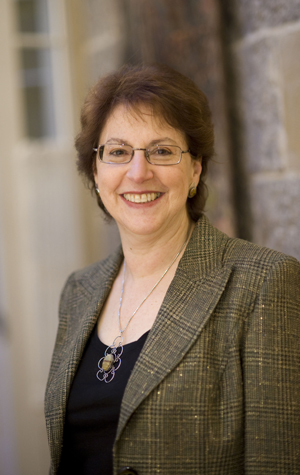Will Math Help Cure Brain Diseases? CAS Prof Says Maybe
Kopell elected to London Mathematical Society

Mathematics may someday help unravel the awful mysteries of brain diseases like Parkinson’s, schizophrenia, epilepsy, and autism. Nancy Kopell’s own research into the intersection of numbers and neurons earned her a “genius” award from the MacArthur Foundation in 1990. Now that same research has put her in a club to which Einstein belonged.
Kopell, a College of Arts & Sciences mathematics professor, has been elected an honorary member of the 146-year-old London Mathematical Society (LMS) by the group’s governing council. The accolade cites her work “on the neural networks governing rhythmic motor activities in animals and her ongoing work on the brain dynamics underlying various cognitive factors.” (The LMS voted Einstein an honorary member in 1924.)
In plain English, the roughly 100 billion neurons in the human brain behave in patterns governed by the same physical laws as, say, molecules that “condense from gas to liquid, or freeze from liquid to solid,” as one science writer puts it. Kopell says her work seeks to discover “how the brain produces its rhythmic dynamics, how it uses them for cognition, and how the symptoms in neurological diseases are related to pathological changes in brain rhythms. I’m especially interested in Parkinson’s disease and schizophrenia.”
For the moment, the work is basic science, Kopell says, “but it has strong implications for the etiology of disease and, perhaps in the future, for novel interventions.”
With the 2,300-member LMS electing just one or two honorary members annually since 1871, “It is a very special recognition,” says Kopell, one of BU’s William Fairfield Warren Distinguished Professors and a founder and director of the Center for Biodynamics. “The list of previous awardees is extremely impressive, and I’m extremely honored to be in that company.”
In addition to the prestige, membership enables her to receive the LMS journal, but doesn’t directly affect her teaching or research, she says.
Tasso Kaper, chairman of the mathematics department, says among other honorary members are Andrew Wiles, for proving Fermat’s Last Theorem (which for centuries had stumped mathematicians trying to confirm its contention that a particular, simple equation could not be solved), and Terence Tao, of UCLA, considered by many the most prolific living mathematician.
“This is a terrific recognition and impressive company,” Kaper says of Kopell’s election, “a singular honor for her and, by association, also for Boston University.”
Kopell, with an AB from Cornell and PhD from Berkeley, came to BU in 1986. Her previous honors include election to the National Academy of Sciences and the American Academy of Arts and Sciences, as well as Guggenheim and Alfred P. Sloan fellowships.

Comments & Discussion
Boston University moderates comments to facilitate an informed, substantive, civil conversation. Abusive, profane, self-promotional, misleading, incoherent or off-topic comments will be rejected. Moderators are staffed during regular business hours (EST) and can only accept comments written in English. Statistics or facts must include a citation or a link to the citation.